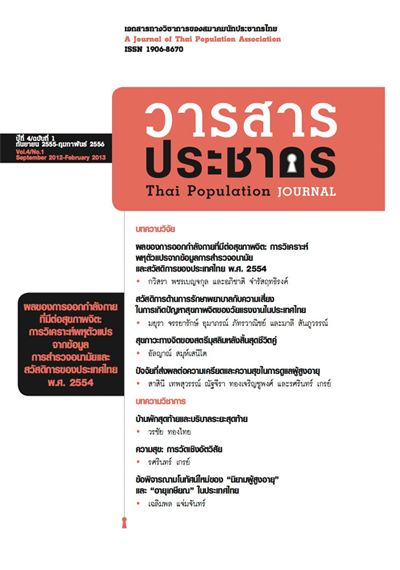ปีที่ 4 ฉบับที่ 1 เดือนกันยายน 2555-กุมภาพันธ์ 2556
 |
บทความวิจัย
บทความวิชาการ
1 Institute for Population and Social Research, Mahidol University 2 Nursing Deparment, Siriraj Hospital 3 Reproductive Health of Thai-Muslims in the Southernmost Border of Thailand Research Unit, Faculty of Humanities and Social Sciences Prince of Songkla University, Pattani Campus |
ผลของการออกกำลังกายที่มีต่อสุขภาพจิต: การวิเคราะห์พหุตัวแปรจากข้อมูลการสำรวจอนามัยและสวัสดิการของประเทศไทย พ.ศ. 2554
กวิสรา พชรเบญจกุล และอภิชาติ จำรัสฤทธิรงค์
บทคัดย่อ
การศึกษานี้มุ่งเน้นที่จะสะท้อนให้เห็นถึงความสำคัญของการออกกำลังกายที่มีผลต่อสุขภาพจิตของคนไทย โดยใช้ข้อมูลจากการสำรวจอนามัยและสวัสดิการ พ.ศ. 2554 ของสำนักงานสถิติแห่งชาติ โดยผู้ให้ข้อมูลเป็นประชากรที่มีอายุ 15 ปีขึ้นไป รวมทั้งสิ้น 28,654 คน เป็นผู้ออกกำลังกายร้อยละ 28 ผลการศึกษาคนไทยอายุ 15 ปีขึ้นไป ยืนยันได้ว่าการออกกำลังกายมีผลต่อสุขภาพจิตอย่างชัดเจนและมีนัยสำคัญทางสถิติ กล่าวคือ ผู้ที่ออกกำลังกายจะมีสุขภาพจิตดีกว่าผู้ที่ไม่ได้ออกกำลังกาย โดยเฉพาะการออกกำลังกาย ด้วยวิธี Anaerobic สำหรับระยะเวลาที่เหมาะสมสำหรับการออกกำลังกาย พบว่าจำนวนวันที่ออกกำลังกายต่อเดือน และจำนวนเดือนที่ออกกำลังติดต่อกันที่ยาวนานขึ้นจะมีผลในทางบวกต่อคะแนนสุขภาพจิต หากพิจารณาร่วมกับวิธีออกกำลังกาย พบว่าผู้ที่ออกกำลังกายแบบ Aerobic การออกกำลังกายติดต่อกันนานหลายวันเป็นระยะเวลาหลายเดือนและมีความสม่ำเสมอในแต่ละครั้ง ขณะที่ผู้ออกกำลังกายโดยวิธี Anaerobic การออกกำลังกายติดต่อกันนานเป็นระยะเวลาหลายวันต่อเดือนจะช่วยส่งเสริมสุขภาพจิตให้ดีขึ้น การออกกำลังกายดังกล่าวนี้ทั้ง Aerobic และ Anaerobic มีผลดีต่อสุขภาพจิตทั้งใน ภาพรวมและการวิเคราะห์องค์ประกอบสุขภาพจิตในด้านต่างๆ ด้วยเช่นกัน อย่างไรก็ตาม การออกกำลังกายวิธี Anaerobic ที่ติดต่อกันเป็นระยะเวลาหลายเดือนอาจมีผลเสียต่อสุขภาพจิตในบางองค์ประกอบ การออกกำลังกายจึงควรยึดหลักความพอดีด้วยจึงจะเป็นประโยชน์สูงสุด
คำสำคัญ: สุขภาพจิต, การออกกำลังกาย, แอโรบิค และแอนแอโรบิค
The Impact of Exercise on Mental Health: A Multivariate Analysis of the Survey of Health and Welfare in Thailand 2011
Kavisara Pacharabenjakul and Aphichat Chamratrithirong1
Abstract
The objective of this study is to assess the impact of exercise on the mental health of Thais. The source of data is the Survey of Health and Welfare conducted by the National Statistical Office in 2011 among a sample of 28,654 persons age 15 years or over. The survey found that 28% of the sample exercised. The study confirms with statistical significance that those who exercised had better mental health than those who did not. This is especially true for those who practiced anaerobic exercise. The survey also found that the greater number of days in a month, and the greater the number of continuous months with exercise had positive impacts on mental health scores. When analyzed together with type of exercise, this study found that periods of regular, consistent aerobic exercise extending over many months, and anaerobic exercise for many days in the month, have positive impacts on mental health. In general, the positive impacts of both aerobic and anaerobic exercises are found on overall mental health as well as on specific components of mental health. However, anaerobic exercises extending over many months may have negative impact on certain components of mental health. Exercise should be considered with moderation for its highest benefit.
Keywords: Mental Health, Exercise, Aerobic, Anaerobic
1 Institute for Population and Social Research, Mahidol University
สวัสดิการด้านการรักษาพยาบาลกับความเสี่ยงในการเกิดปัญหาสุขภาพจิตของวัยแรงงานในประเทศไทย
มยุรา จรรยารักษ์1 อุมาภรณ์ ภัทรวาณิชย์ และมาลี สันภูวรรณ์2
บทคัดย่อ
การศึกษานี้มีวัตถุประสงค์เพื่อวิเคราะห์สวัสดิการด้านการรักษาพยาบาลที่มีผลต่อความเสี่ยงในการเกิดปัญหาสุขภาพจิตของกลุ่มประชากรวัยแรงงาน โดยควบคุมด้วยปัจจัยระดับบุคคลและปัจจัยระดับชุมชน จากข้อมูลทุติยภูมิของโครงการสำรวจสุขภาพจิตคนไทยที่ดำเนินการไปพร้อมกับการสำรวจภาวะเศรษฐกิจและสังคมของครัวเรือน พ.ศ. 2552 ของสำนักงานสถิติแห่งชาติ มีประชากรวัยแรงงานอายุ 15-59 ปี จำนวน 62,229 คน เป็นผู้ให้ข้อมูล ผลการศึกษาพบว่า ประมาณหนึ่งในสิบของวัยแรงงาน มีความเสี่ยงในการเกิดปัญหาสุขภาพจิต และสวัสดิการด้านการรักษาพยาบาลส่งผลต่อความเสี่ยงในการเกิดปัญหาสุขภาพจิตของวัยแรงงานในประเทศไทย โดยที่ผู้ที่ได้รับสวัสดิการข้าราชการ/รัฐวิสาหกิจน่าจะมีความเสี่ยงด้านสุขภาพจิตน้อยกว่าผู้ที่ได้รับสวัสดิการจากนายจ้าง จากหลักประกันสุขภาพถ้วนหน้า จากระบบประกันสังคม และไม่ได้รับสวัสดิการ อย่างไรก็ตาม ผู้ที่ได้รับสวัสดิการข้าราชการ/รัฐวิสาหกิจ มีความเสี่ยงในการเกิดปัญหาสุขภาพจิตมากกว่าผู้ที่มีประกันสุขภาพเอกชน นอกจากนี้ยังพบว่า ปัจจัยระดับบุคคล ได้แก่ เพศ สถานภาพสมรส ระดับการศึกษา อาชีพ ประเภทค่าจ้างและรายได้ ปัจจัยระดับชุมชนได้แก่ ภูมิภาคและเขตที่อยู่อาศัย ส่งผลต่อความเสี่ยงในการเกิดปัญหาสุขภาพจิตอย่างมีนัยสำคัญทางสถิติ ดังนั้นข้อเสนอแนะจากผลการศึกษานี้คือ หนึ่ง รัฐควรเร่งประสานความร่วมมือระหว่างกองทุนต่างๆ เพื่อลดความเหลื่อมลำของสิทธิ ประโยชน์ด้านสุขภาพ และ สองหน่วยงานที่เกี่ยวข้องควรเพิ่มความรู้เกี่ยวกับการส่งเสริมสุขภาพจิตไว้ในหลักสูตรการศึกษาระดับประถมศึกษา
คำสำคัญ: สุขภาพจิต สุขภาพจิตวัยแรงงาน สวัสดิการกับสุขภาพจิต
1 งานพยาบาลผู้ป่วยพิเศษ ฝ่ายการพยาบาล, โรงพยาบาลศิริราช
2 สถาบันวิจัยประชากรและสังคม มหาวิทยาลัยมหิดล
Medical Benefits and Risk of Mental Health Problems among the Working-Age Population in Thailand.
Mayura Junyaruk1, Umaporn Pattaravanich and Malee Sunpuwan2
Abstract
This study aimed to compare the mental health of individuals with different medical benefits of the working-age population in Thailand. The research was based on survey data from the Thai Mental Health Project. The data was collected by the National Statistical Office in the 2009 Household Socio-Economic Survey. The sample group included 62,229 respondents aged 15-59 years old. The data was analyzed by Logistic Regression. The results showed that about one-tenth of the working-age population have a risk for mental health. From the Logistic Regression analysis, medical benefits statistically significant affect the risk for mental health of the working-age population. Moreover, individual factors such as gender, marital status, education, occupation, wage, and income as well as community factors such as area, and region, affect the risk for mental health of the working-age population. From the results of this research, it is suggested that 1) the government should enhance to cooperate with the health fund agencies in order to decrease the gap of health inequality rights. 2) The government should add a course for mental health
promotion in the curriculum of primary school education.
Keywords: Mental health, Mental health of working-age population, Medical Benefits and mental health
1 Nursing Deparment, Siriraj Hospital
2 Institute for Population and Social Research, Mahidol University\
สุขภาวะทางจิตของสตรีมุสลิมหลังสิ้นสุดชีวิตคู่
อัลญาณ์ สมุห์เสนีโต1
บทคัดย่อ
บทความนี้ นำเสนอในประเด็น 1) การหย่าร้างในศาสนาอิสลามเป็นอย่างไร 2) สุขภาวะทางจิตของผู้หญิงมุสลิมหลังสิ้นสุดชีวิตคู่เป็นอย่างไร จากการสัมภาษณ์ผู้ให้ข้อมูลซึ่งเป็นสตรีมุสลิมที่สิ้นสุดชีวิตคู่ตามหลักศาสนาอิสลาม อาศัยอยู่ในจังหวัดปัตตานี ผลจากการสัมภาษณ์รายงานว่า ส่วนใหญ่ผู้ชายมุสลิมไม่ได้ปฏิบัติตามหลักการหย่าร้างในศาสนาอิสลามในการเลี้ยงดูและจ่ายค่าอุปการะแก่ภรรยาเดิมและบุตร ในด้านสุขภาวะทางจิตของสตรีมุสลิมหลังการสิ้นสุดชีวิตคู่ พบว่า แม้ว่าช่วงแรกจะมีอาการเศร้าซึมและไม่สามารถยอมรับตนเองในสถานภาพที่เปลี่ยนไปได้ แต่เมื่อทำใจยอมรับได้ในระยะเวลาต่อมา ทำให้มีสุขภาพจิตดีขึ้นและส่งผลต่อด้านเศรษฐกิจดีขึ้นตามลำดับ ทั้งนี้ ปัจจัยสำคัญที่ทำให้ตนเองมีกำลังใจเข้มแข็งมากขึ้น เพราะมีบุตรเป็นกำลังใจ สำหรับผู้ที่ไม่มีบุตรสุขภาพจิตดีขึ้น เพราะการยอมรับในสิ่งที่ตนเองเป็นอยู่และไม่มองตนเองตามบรรทัดฐานทางสังคม แต่เลือกที่จะให้สังคมมองตนเองตามที่ตนเองเป็น
คำสำคัญ: การสิ้นสุดชีวิตคู่, สุขภาพจิต
1 หน่วยวิจัยอนามัยเจริญพันธุ์ของชาวไทยมุสลิมในพื้นที่สามจังหวัดชายแดนใต้ คณะมนุษยศาสตร์และสังคมศาสตร์ มหาวิทยาลัย
สงขลานครินทร์ วิทยาเขตปัตตานี
Mental health of Thai-Muslim women after termination of marriage
Anlaya Smuseneto1
Abstract
This paper aims to present the general overview of Muslim divorce, with a particular emphasis on the mental health of Muslim females due to their marriage termination. This study was carried out by intensive interviews with Thai-Muslim women in Pattani Province, all of whom were divorced or separated from their husbands by the Muslim rules. It has revealed that most Thai-Muslim males did not abide by the Muslim rules of divorce, especially concerning maintenance given to their former wives and, if any, children. Regarding mental health of wives after marriage termination, depression and self-denial occurred in the first instance.
However, when they were able to accept their changing marital status, their mental health gradually improved and this also contributed to their better economy. A major factor leading to such improvements was their children’s emotional support. For those without children, self-acceptance, self-esteem, and spiritual independence from social injustice are the keys to their well-being.
Keywords: Marriage termination, Mental health
1 Reproductive Health of Thai-Muslims in the Southernmost Border of Thailand Research Unit, Faculty of
Humanities and Social Sciences Prince of Songkla University, Pattani Campus
